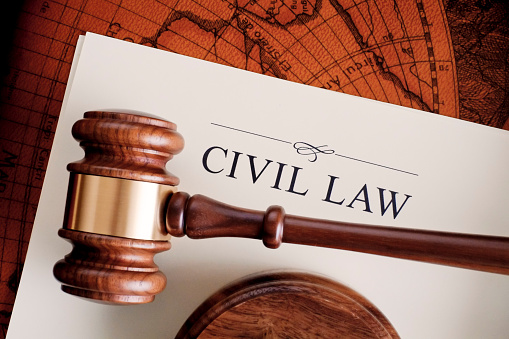Table of Contents
Introduction
The whole story of CPC begins with the word ‘Rights’. In the beginning during the stone age when man was a Paleolithic man or a Neolithic man, there were no rights per se and survival of the mightiest was the only law. Man was not meant to live in such an environment and that is why slowly the concept of social order came in. The Basis of social order was mutuality.
Mutuality means respect for other rights. Thus, it creates an obligation on a man to respect and protect the rights of other men in a society. This aspect of mutuality gave rise to a ‘Civilization’. The emanation of the word ‘Civil’ in civilization tells about the society.
What is Civil Law
The word Civil comes from a Latin word ‘Civilis’ which basically means ‘Relating To Citizens’ also in modern day we call it ‘Cultured People’. These are those people who understand and recognise the rights of other people in the country.
Civil law is basically a body of rules that defines and protects the private rights of the citizens, offering legal remedy that may be sought in a dispute and covers areas of law such as Torts, Contracts, Property & Family Law etc.
Civil law is also called a private law as it deals with disputes between two individuals. Thus, civil right is an enforceable right or privilege which if interfered by another gives rise to an action for injury.
Features Of Civil Law
The essential features of the law of civil procedure can be categorized into following classes:
- Complementary Nature: The law of civil procedure is ordinarily contrasted with substantive law. However, on many occasions it has been held by courts that procedural law like civil law are complementary to substantive law and by providing its remedy and effectiveness and bringing it into being.
- Codified Law: Civil laws are almost mostly a set of codified laws. A codified civil law consists of a series of articles in the form of general rules, that are flexible enough to be applied to concrete circumstances. Such codification helps in providing greater certainty of law and makes the legal principles more clear and specific.
- Protective Nature: The law of civil procedure safeguards every person and his right to life, liberty, reputation, livelihood and property. It also ensures that no person shall suffer any deprivation of his rights, except in accordance with the accepted rules of procedure.
- Private Law: Civil law specifically deals with the private rights of citizens. It applies to the disputes between two or more individuals or legal entities, concerning any legal relationship or obligations.
- Remedial or Practical Nature: The law of civil procedure deals with the actual litigation process itself, in accordance with the practice and procedure of the courts and enhances the importance and application of the rules, practical and procedural modes and methods for the conduction of the judicial process.
- Jurisdiction: The extent of application of civil laws may subjectively vary depending on the territory, citizens, etc. In India, CPC extends to the whole of India which can be extended to the State of Nagaland and the tribal areas as may be specified in the notification.
Substantive Law and Procedural Law
Generally, any law which fixes duties, establishes rights and responsibilities among and for persons, natural or otherwise, are substantive laws in character, while those that merely prescribe the manner in which such rights and responsibilities may be exercised and enforced in a court are procedural laws.
Examining such distinction in the case of Commissioner of Wealth Tax v. Sharvan Kumar Swarup, the Supreme court referred to Salmond’s Jurisprudence and stated:
“The law of procedure may be defined as that branch of the law which governs the process of litigation. It is the law of actions “Jus Quod Ad Actions Parti nen” using the term action in a wide sense to include all legal proceedings, civil or criminal. All the residue is substantive law, and relates, not to the process of litigation, but to its purposes and subject-matters.
However, Substantive law is concerned with the ends which the administration of justice seeks, procedural law deals with the means and instruments by which those ends are to be attained. The latter regulates the conduct and relations of courts and litigants in respect of the litigation itself; the former determines their conduct and relations in respect of the matters litigated.”
Similarly, in the case of Balavant Rao v. Geeta, the Karnataka High Court opined that:
“If a piece of substantive law is amended, then such a law would have prospective operation unless made retrospective, either expressly or by necessary intendment. But when it comes to procedural law, the position is contrary. In the case of an amendment of a procedural law, the amendment is always retrospective in operation, unless by a contra indication is made that it is only prospective.”
Civil Law Is An Adjective Law
The law of civil procedure prescribes the procedure for enforcement of substantive civil rights. Although the substantive civil right laws are more important than civil procedural laws, the efficacy of substantive civil laws mainly depends on the quality of the law of civil procedure. Thus, the law of civil procedure is an adjective law to facilitate justice and further its ends.
In the case of State Of Punjab vs Shyam Lal Murari, Justice Krishna Iyyer says that, ” We must always remember that the procedural law is not to be a tyrant, but a servant and not an obstruction but an aid to Justice. Its handmaid and not a mistress; a lubricant and not a resistant in the administration of justice.
Substantive law usually determines the rights and liabilities of parties. It creates substantive legal rights, defines them and confers them upon parties. It also defines the extent of legal duties. Examples: The Indian Contract Act, the Transfer of Property, The Negotiable Instruments Act and Indian Penal Code etc.
While, Adjective Or Procedural Law prescribes the practice, procedure and machinery for enforcement of those rights and liabilities which are conferred by Substantial Law. Examples: Code of Civil Procedure, Indian Evidence Act, Limitation Act and Code of Criminal Procedure etc.
The function of procedural law or adjective law is to “facilitate justice and further its ends, the rules of procedure must be construed liberally and in such a manner that renders the enforcement of substantive rights effective.” Thus, a hyper-technical view must not be adopted by courts in interpreting procedural laws. For example, a party cannot be refused relief merely because of some mistake, negligence, inadvertence or infraction of the rules of procedure.
In case of Syyed Mohammad vs Abdul Habib Hasan, 1998, S.C. It was held that, ‘A procedural law is always subservient to substantive law. Nothing can be given by procedural law what is not sought to be given by substantive law and nothing can be taken away by a procedural what is given by substantive law.’ Thus, any procedural irregularities will not vitiate a trial.
Law of civil procedure plays an important role of adjective law by forming an indispensable part of the machinery of justice and operates as an essential tool towards:
- Enforcing legal rights and claims.
- Redressing or preventing legal wrongs.
- Asserting legal defenses.
- Other ancillary purposes, notwithstanding its apparent complexity and its occasional technicality.
Conclusion
Thus, Civil laws are the body of rules dealing with the civil rights of citizens. They play a crucial and determining role in expediting the adjudication of civil disputes. Thus, the law of civil procedure is an adjunct or an accessory to substantive law.
Reference
- What is civil Law- Ipleaders https://blog.ipleaders.in/civil-law/#Where_can_we_find_Civil_Law
- Code Of Civil Procedure, Second Edition- By Jatindar Kumar Das
- Commissioner Of Wealth Tax vs Sharvan Kumar



